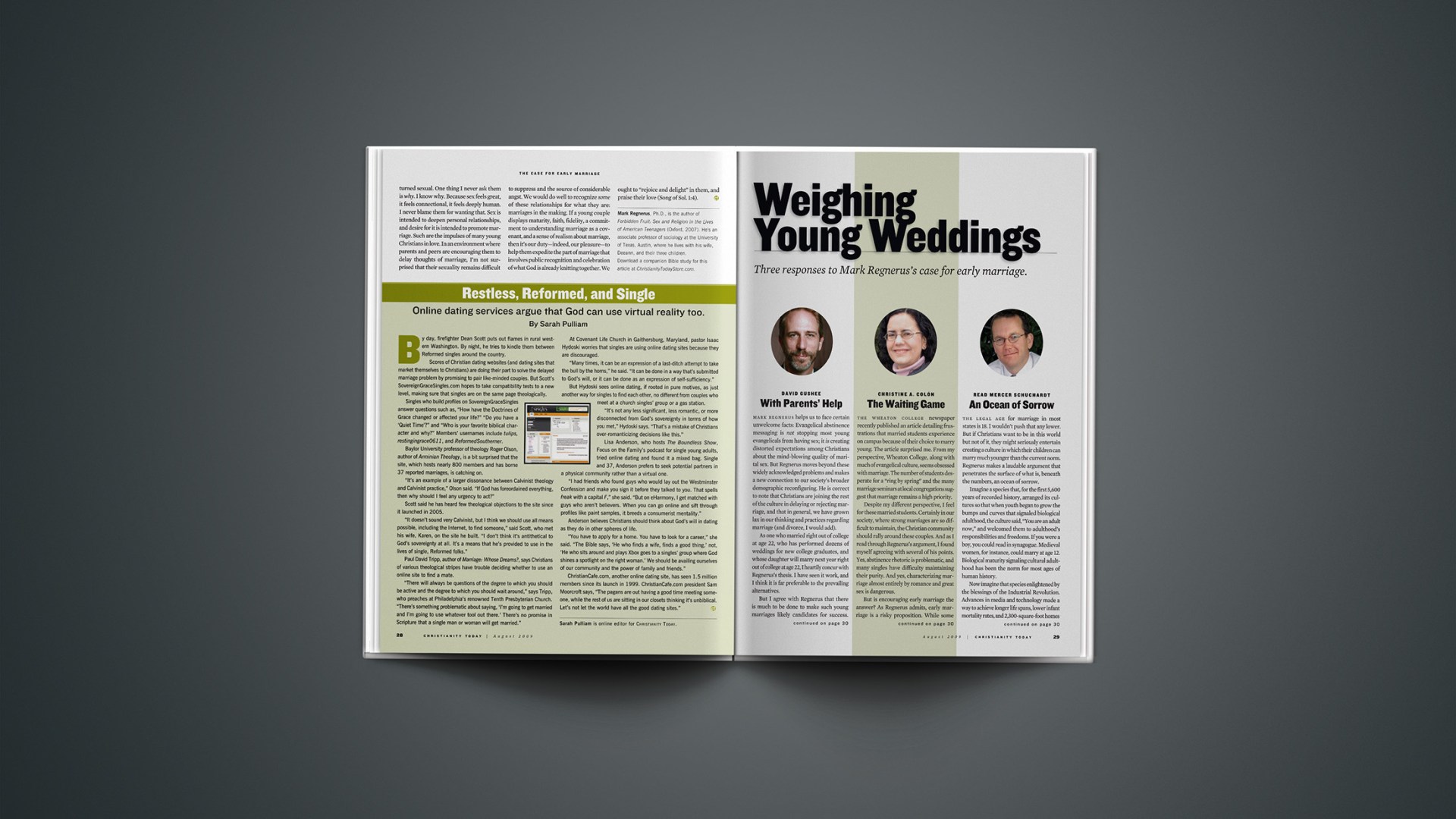The following article is part of Christianity Today’s cover package on “The Case for Early Marriage.”
Mark Regnerus helps us to face certain unwelcome facts: Evangelical abstinence messaging is not stopping most young evangelicals from having sex; it is creating distorted expectations among Christians about the mind-blowing quality of marital sex. But Regnerus moves beyond these widely acknowledged problems and makes a new connection to our society’s broader demographic reconfiguring. He is correct to note that Christians are joining the rest of the culture in delaying or rejecting marriage, and that in general, we have grown lax in our thinking and practices regarding marriage (and divorce, I would add).
As one who married right out of college at age 22, who has performed dozens of weddings for new college graduates, and whose daughter will marry next year right out of college at age 22, I heartily concur with Regnerus’s thesis. I have seen it work, and I think it is far preferable to the prevailing alternatives.
But I agree with Regnerus that there is much to be done to make such young marriages likely candidates for success. Perhaps the most important practical shift will involve parental economic support for young married couples. It is clear that at least middle-class and upper-middle-class marriages are being delayed in large part because of the need for graduate education to obtain a decent job.
While Jeanie and I worked terribly hard in our early days of marriage to make ends meet while we were both in school, we also received timely financial help from our parents. Parents need to get past the myth that their 22-year-old newlywed children ought to be able to handle all of their expenses on their own.
But Regnerus is also right that, for the relatively young couple to have a chance at lifelong marriage, they must also address less tangible concerns. Extended adolescence and fewer role models mean that fewer 22-year-olds, especially men, are mature enough to even consider getting married. They may be more likely to make a foolish choice based on romantic feelings, sexual attraction, or a misguided sense of God’s will. But Regnerus is right in suggesting that even imperfect motivations or an imperfect choice (for all motivations and partners are imperfect) can be overcome through a recovery of the toweringly important concept of marriage as a binding, sacred covenant before God.
As marriage collapses or is redefined beyond recognition in our culture, marriage as God intended it is becoming a profoundly countercultural reality enjoyed by a relatively small percentage of the American population. They will know we are Christians by our (marital) love.
David Gushee, Distinguished University Professor of Christian Ethics at Mercer University, and author of Getting Marriage Right (Baker, 2004)
Copyright © 2009 Christianity Today. Click for reprint information.
Related Elsewhere:
This article responds to the cover package on “The Case for Early Marriage.“
Previous Christianity Today articles about marriage include:
My Top Five Books on Marriage | By Charles W. Tackett, CEO of PursuingHeart.com (May 7, 2009)
Choosing Celibacy | How to stop thinking of singleness as a problem. (September 12, 2008)
Practicing Chastity | A lifelong spiritual discipline for singles and marrieds. Lauren F. Winner reviews Dawn Eden’s The Thrill of the Chaste. (March 15, 2007)
30 and Single? It’s Your Own Fault | There are more unmarried people in our congregations than ever, and some say that’s just sinful. (June 21, 2006)
Sex in the Body of Christ | Chastity is a spiritual discipline for the whole church. (May 13, 2005)
Reflections: Sex, Love, and Marriage | Quotations to stir the heart and mind (February 1, 2003)



